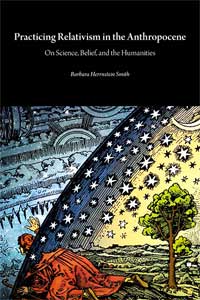Practicing Relativism in the Anthropocene: On Science, Belief, and the Humanities
by Barbara Herrnstein Smith

- Critical Climate Change
- Published: 2018
- ISBN: 978-1-78542-070-2
- PDF ISBN: 978-1-78542-069-6
Barbara Herrnstein Smith addresses a set of contemporary issues involving knowledge and science from a constructivist-pragmatist perspective often labeled “relativism.” Practicing that relativism, she argues, does not mean refusing judgment or asserting absurdities but being conscious of the existence and significance of contingency, complexity, and multiplicity.
Rejecting classic and neorealist views of knowledge and human cognition, Smith describes important alternative accounts in cognitive theory, science studies, and contemporary philosophy of mind. The “relativism” commonly associated with these alternative accounts, she maintains, is a chimera—part straw man, part red herring. Objections to the position so named typically involve crucially improper paraphrase of empirical observations of variability and contingency or dismaying inferences improperly drawn from such observations.
In an extended examination of recent writings by Bruno Latour, Smith indicates the increasing centrality of theological investments in his work and both the interest of those writings but also their limits for humanities scholars seeking to appropriate them. Discussing computational methods in literary studies, she describes how the idea of “close reading” has operated historically in the Anglo-American literary academy and how it figures now in the discourses of the digital humanities. Efforts to make the aims and methods of the humanities more scientific, she suggests, typically involve ill-informed or otherwise dubious conceptions of science. What distinguishes the humanities and the natural sciences, she argues, are neither subject areas nor methods as such but fundamental epistemic orientations. Declining calls to reaffirm or rehabilitate philosophical realism in the face of denials of climate change, Smith maintains that the most illuminating perspectives for conceptualization and practice in the Anthropocene are precisely those labeled, but commonly mischaracterized as, “relativist.”
Practicing Relativism is an admirably short, elegant and enjoyable introduction to the breadth of Barbara Herrnstein Smith’s thought, and will recharge the antifoundationalist batteries of her fans. Coming from science and technology studies, I found her engagements with scientism in the humanities and with Bruno Latour in chapters on religion and the Anthropocene especially thought-provoking.Andrew Pickering, Emeritus Professor, University of Exeter
This tightly integrated collection of essays introduces newcomers to the shape, scope, texture, and quality of Barbara Herrnstein Smith’s thought, and, for readers familiar with Smith’s many books and articles, it pulls into focus the unity of her diverse achievements and the timeliness—indeed, the urgency—of this unified practice for our times By her own example, Smith calls the question on the whirligig of postures, polemics, interventions, and speculations that make up much of academic life today. She sets us several levels above the fray (e.g., close v. distant reading debates; constructivist v. realist debates; neutrality v. commitment debates; humanities v. science debates) so that we can see it, as she does, in genuinely critical terms. Her beautifully lucid, self-accounting intellectual conduct (and combat) reminds us that critical doesn’t mean dismissive; it means grasping the truthfulness of the illusions that we live and work by, and in Smith’s case, it means patiently and clearly explaining the origins, motivation, and above all, the consequences of those illusions, giving us the freedom to choose maintaining or abandoning them. Barbara Herrnstein Smith is at once (and has always been) the sharpest knife in the block and the most supple, subtle, and capacious of thinkers. Her work sets an ideal for critical study today; we can’t match it but knowing it’s there and measuring our work against it—against its intelligence, good sense, worldliness, humor, and intellectual largeness and largesse—is a good in itself.Marjorie Levinson, F.L. Huetwell Professor of English, University of Michigan
It is a sheer pleasure to read along with Barbara Herrnstein Smith, and this collection of recent essays brings her to readers in an especially unvarnished and accessible form. Never dismissive or petty, Smith in these conversational excursions invites us to enjoy the contemporary sciences and letters – especially versions of psychology – in her bracing company. She insists always on more rigorous argument and at the same time shows how writing of many different kinds serves and disserves the human sciences and our hopes for a larger understanding. Her criticism of important thinkers is as often warmly appreciative as it is demanding. Smith treats us to delicious turns of phrase – like the “straw herrings” thrown up by relativism’s critics, and like scientists burrowing for literary discoveries “in the bosom of reality” (their words, not hers!). Along the way she delivers politically canny lessons in how to think. There’s an urgency in these commentaries: We’d better start making sense soon, here in the Anthropocene, as our predictable confusions and all-too-familiar nonsense have become very pernicious. Smith’s writing is an intellectual tonic. Deeply sensible, realistic in the best sense of the term, essays like these give one courage in dark times.Judith Farquhar, Max Palevsky Professor Emeritus, Department of Anthropology, University of Chicago
Author Bio
Barbara Herrnstein Smith is Braxton Craven Professor Emerita of Comparative Literature and English at Duke University and former director of its Center for Interdisciplinary Studies in Science and Cultural Theory. Her books include Contingencies of Value: Alternative Perspectives for Critical Theory (1988); Belief and Resistance: Dynamics of Contemporary Intellectual Controversy (1997); Scandalous Knowledge: Science, Truth and the Human (2004); and Natural Reflections: Human Cognition at the Nexus of Science and Religion (2009). Smith is a member of the American Academy of Arts and Sciences and an honorary fellow of the American Association for the Advancement of Science.
